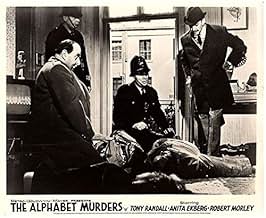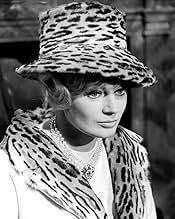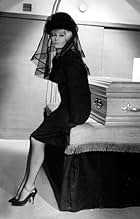IMDb RATING
5.3/10
2K
YOUR RATING
Hercule Poirot investigates a series of murders in London in which the victims are killed according to their initials.Hercule Poirot investigates a series of murders in London in which the victims are killed according to their initials.Hercule Poirot investigates a series of murders in London in which the victims are killed according to their initials.
- Director
- Writers
- Stars
- Director
- Writers
- All cast & crew
- Production, box office & more at IMDbPro
Featured reviews
Awful film version of Agatha Christie's detective novel with Randall, in one of the finest cases of miscasting, as Dame Agatha's famous Belgian sleuth Hercule Poirot. Randall doesn't even have the timing and flair of the author's creation, while co-star Robert Morley would have made a fine detective, but... instead, we have Randall. The film is directed by cartoon giant Frank Tashlin who makes this film a bit too cartoony. There seems to be more humor than mystery and more of Randall's schtick than Poirot's ingenuity. Disappointing all over.
In order to get even the slightest bit of enjoyment out of THE ALPHABET MURDERS you have to forget that it's based on Agatha Christie's THE ABC MURDERS and disregard the fact that it bears only a slight resemblance to that tale.
If you can't forget, you can't forgive what they've done to a perfectly intriguing Hercule Poirot tale, first of all by casting TONY RANDALL, of all people, as Poirot. That gives you an idea of the broad comedy style the film has. I have great respect for Randall as a more than competent supporting actor in a number of very watchable films, but he's just an odd choice to play Poirot. He doesn't even get the accent right.
But that's not the only fault. Miss Christie's story is a rather far-fetched one to begin with. Here it is even more so because it's played more for farce than it is for murder and intrigue with the usual number of red herrings and suspects thrown into the mix.
Of no help at all is the fact that the supporting cast does include ROBERT MORLEY, ANITA EKBERG, and brief appearances by STRINGER DAVIS and MARGARET RUTHERFORD who describes the whole affair as, "As simple as ABC." She's wrong.
Summing up: Oddly disturbing no matter how you look at it.
If you can't forget, you can't forgive what they've done to a perfectly intriguing Hercule Poirot tale, first of all by casting TONY RANDALL, of all people, as Poirot. That gives you an idea of the broad comedy style the film has. I have great respect for Randall as a more than competent supporting actor in a number of very watchable films, but he's just an odd choice to play Poirot. He doesn't even get the accent right.
But that's not the only fault. Miss Christie's story is a rather far-fetched one to begin with. Here it is even more so because it's played more for farce than it is for murder and intrigue with the usual number of red herrings and suspects thrown into the mix.
Of no help at all is the fact that the supporting cast does include ROBERT MORLEY, ANITA EKBERG, and brief appearances by STRINGER DAVIS and MARGARET RUTHERFORD who describes the whole affair as, "As simple as ABC." She's wrong.
Summing up: Oddly disturbing no matter how you look at it.
Being one of the more elusive films this side of the pond, The Alphabet Murders delivers no more or less than expected (hence the 5/10). But I think you have to ask yourself why your watching it before you condemn it. Christie purists are up in arms, Randall fans defend him, yadda yadda yadda. Personally, I got it for the all too brief Dame Margaret. That said, there's little else to say about it.
Tony Randal is an acquired taste as Poirot, almost getting up your nose with an abysmal accent and acting as if he's the only one with grey cells, and overdoing that. The constant referring of him as a 'short' Belgian is the biggest mystery, as he's taller than most in the film. Poor Robert Morley tries his best, but the tedium of the film mainly comes from the rather repetitive score. Plotwise it doesn't really test the viewer, but enough is happening to keep you guessing. 30 seconds of Margaret Rutherford and spouse puts a much needed grin on the face, but it's not enough by far.
Certainly one to add to the collection, but don't rush for it at the garage sale. Overall, a huge waste of talent. Pity.
Oh, and a reviewer thinks Finney's Poirot was a masterpiece? Yeah. Right.
Tony Randal is an acquired taste as Poirot, almost getting up your nose with an abysmal accent and acting as if he's the only one with grey cells, and overdoing that. The constant referring of him as a 'short' Belgian is the biggest mystery, as he's taller than most in the film. Poor Robert Morley tries his best, but the tedium of the film mainly comes from the rather repetitive score. Plotwise it doesn't really test the viewer, but enough is happening to keep you guessing. 30 seconds of Margaret Rutherford and spouse puts a much needed grin on the face, but it's not enough by far.
Certainly one to add to the collection, but don't rush for it at the garage sale. Overall, a huge waste of talent. Pity.
Oh, and a reviewer thinks Finney's Poirot was a masterpiece? Yeah. Right.
I'm quirky about Christie mysteries, so take this comment with caution. Most viewers seem to think this a failed comedy, a poor "Pink Panther," and I liked it.
First, the form of the thing: in key plot elements, it is a rather close adaptation of a Christie book where a murderer "tells a story" in his murders in order to throw the police off. So it begins by being a story about fooling the detective inside another story (the movie) about trying to fool us as detectives.
The clue is about words. As a mystery, it is one of the clever explorations that Agatha had, looking at every way she could legally twist the convention of the form.
The tone of the thing is what is at issue. Peter Sellers had just had a hit with "Pink Panther" as a bumbling French detective and Poirot inherits some of this. Christie intended for him to be comic in a pompous way, and to varying degrees played with the tension between his genteel buffoonery and his sharp mechanical mind. It was not a simple joke, because her goal in part was to both describe and comment on how such an interesting mind would work.
She explored this indirectly by describing his manner, his minor superstitions, his attention to domestic ritual, the vanity of the perfect phrase, whether as a thought or a courtesy. She couldn't do that with Marple, who was as sharp but whose mind and manner was crass and impolite.
So part of the game for me in watching film versions is in how the adapter treats the relationship with the viewer so far as the mystery proper. There are all sorts of narrative mechanics that are involved there than aren't worth mentioning now. The other part is in how the mind of the detective is portrayed, and since we can only see the mind through the story (as I just said) and in the person's manner, that manner is key.
I think I liked this Poirot better than any of the others. They're all comic in one way or another, and this one seems further in tone from what was written. It is, but it may be closer in intent even though its in a context of Jerry Lewis slapstick.
Consider this: in mystery your mind and the detective's are supposed to parallel each other in important ways. In creating a version of the story -- the truth -- despite attempts to force it others wise, you both do this. So in fact, you create the world itself in a way. Some of the basic mechanics are frozen in life as in the genre, but others are completely open for you both to make: matters of how clever fate is, how comic are the wheels of nature, how inevitable is justice, what justice means, how conscience and consequence matter.
If the filmmaker can harmonize the tone of what you as viewer see and create in your own mind of the world, with what your surrogate the detective does, then he has succeeded and you can enter the movie whole.
This movie seems trivial. I think it is all but impossible to see. But it succeeds with its Poirot where no other attempt does.
Ted's Evaluation -- 3 of 3: Worth watching.
First, the form of the thing: in key plot elements, it is a rather close adaptation of a Christie book where a murderer "tells a story" in his murders in order to throw the police off. So it begins by being a story about fooling the detective inside another story (the movie) about trying to fool us as detectives.
The clue is about words. As a mystery, it is one of the clever explorations that Agatha had, looking at every way she could legally twist the convention of the form.
The tone of the thing is what is at issue. Peter Sellers had just had a hit with "Pink Panther" as a bumbling French detective and Poirot inherits some of this. Christie intended for him to be comic in a pompous way, and to varying degrees played with the tension between his genteel buffoonery and his sharp mechanical mind. It was not a simple joke, because her goal in part was to both describe and comment on how such an interesting mind would work.
She explored this indirectly by describing his manner, his minor superstitions, his attention to domestic ritual, the vanity of the perfect phrase, whether as a thought or a courtesy. She couldn't do that with Marple, who was as sharp but whose mind and manner was crass and impolite.
So part of the game for me in watching film versions is in how the adapter treats the relationship with the viewer so far as the mystery proper. There are all sorts of narrative mechanics that are involved there than aren't worth mentioning now. The other part is in how the mind of the detective is portrayed, and since we can only see the mind through the story (as I just said) and in the person's manner, that manner is key.
I think I liked this Poirot better than any of the others. They're all comic in one way or another, and this one seems further in tone from what was written. It is, but it may be closer in intent even though its in a context of Jerry Lewis slapstick.
Consider this: in mystery your mind and the detective's are supposed to parallel each other in important ways. In creating a version of the story -- the truth -- despite attempts to force it others wise, you both do this. So in fact, you create the world itself in a way. Some of the basic mechanics are frozen in life as in the genre, but others are completely open for you both to make: matters of how clever fate is, how comic are the wheels of nature, how inevitable is justice, what justice means, how conscience and consequence matter.
If the filmmaker can harmonize the tone of what you as viewer see and create in your own mind of the world, with what your surrogate the detective does, then he has succeeded and you can enter the movie whole.
This movie seems trivial. I think it is all but impossible to see. But it succeeds with its Poirot where no other attempt does.
Ted's Evaluation -- 3 of 3: Worth watching.
I have enjoyed David Suchet and Peter Ustinov playing Poirot among other interpretations of the detective, but Randall's turn is equally enjoyable. Randall is not a great actor but a fine comedian. Director Frank Tashlin should know a good comedian when he casts them--he had worked with Danny Kaye and Jerry Lewis to name just two.
The film begins with Randall introducing himself as Poirot with a twinkle in his eye. The director is clear from the first scene--comedy first, mystery next.
Robert Morley is fun, but Randall is even better--the bowling alley, the restaurant gags, the telephone calls--all scenes filled with visual, good humor rather than slapstick. Morley depends on the typical British attitudes, e.g., snapping fingers down the pecking order, jumping queues and not knowing one's shoe size all depicting arrogance of society and wealth. Director Tashlin dishes out a comedy with considerable social comment--Brits who cannot differentiate the French from the Belgian French and are in the police force!
The most intriguing bit was to introduce Margaret Rutherford as Miss Marple and Stringer Davis as Mr Stringer of the Miss Marple films bump into Randall's Poirot briefly. Surely this was a gem of an idea from Tashlin.
The film cannot be easily trashed--it offers comedy and entertainment, nearly 40 years after it was made. It is definitely not the definitive Poirot but an interesting interpretation of Poirot. It is probably one of the best Randall films ranking alongside "The Seven Faces of Dr Lao."
The film begins with Randall introducing himself as Poirot with a twinkle in his eye. The director is clear from the first scene--comedy first, mystery next.
Robert Morley is fun, but Randall is even better--the bowling alley, the restaurant gags, the telephone calls--all scenes filled with visual, good humor rather than slapstick. Morley depends on the typical British attitudes, e.g., snapping fingers down the pecking order, jumping queues and not knowing one's shoe size all depicting arrogance of society and wealth. Director Tashlin dishes out a comedy with considerable social comment--Brits who cannot differentiate the French from the Belgian French and are in the police force!
The most intriguing bit was to introduce Margaret Rutherford as Miss Marple and Stringer Davis as Mr Stringer of the Miss Marple films bump into Randall's Poirot briefly. Surely this was a gem of an idea from Tashlin.
The film cannot be easily trashed--it offers comedy and entertainment, nearly 40 years after it was made. It is definitely not the definitive Poirot but an interesting interpretation of Poirot. It is probably one of the best Randall films ranking alongside "The Seven Faces of Dr Lao."
Did you know
- TriviaThe official screenwriters of this movie, David Pursall and Jack Seddon, were greatly annoyed by the extensive re-writing of their script by Director Frank Tashlin and Robert Morley. Tashlin also encouraged Morley and Tony Randall to ad-lib lines and business.
- GoofsFor the swimming pool murder, when the dart is fired, the view is from behind the murderer and one can plainly see the gun is aimed below and to the right of the victim. Then in the close-up of the victim, the dart is positioned on the left side of his neck as if it had been fired from his left, not mainly from his front. In any case, it is a very unlikely shot with a dart pistol from such a long range.
- Quotes
Miss Jane Marple: [cameo - while walking past Poirot into the police station] The solution is ABC, to anyone with half a brain cell.
- Crazy creditsTony Randall emerges from Borehamwood Studios' Stage 4 to introduce the film and acknowledge his own starring credit, first as himself and then in full Poirot make-up and character.
- ConnectionsReferenced in What's My Line?: Jill St. John (1965)
- How long is The Alphabet Murders?Powered by Alexa
Details
- Release date
- Country of origin
- Language
- Also known as
- Amanda
- Filming locations
- 14 Savile Row, Mayfair, Westminster, Greater London, England, UK(Poirot enters tailor's shop at beginning of film)
- Production companies
- See more company credits at IMDbPro
- Runtime
- 1h 30m(90 min)
- Color
- Aspect ratio
- 1.78 : 1
Contribute to this page
Suggest an edit or add missing content

































